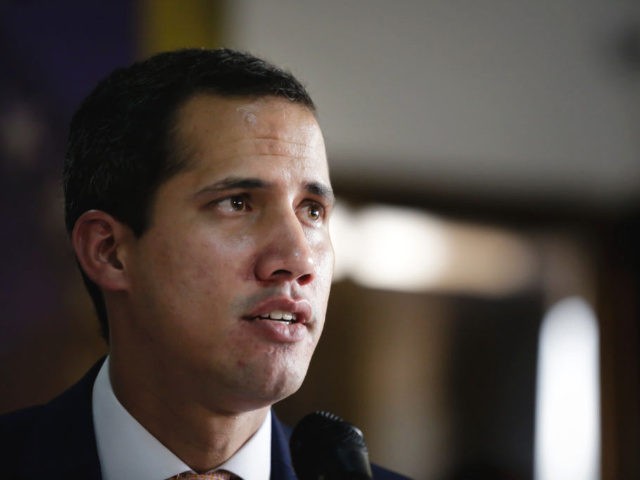A national poll published this week by the firm Meganálisis found that nearly 90 percent of Venezuelans do not believe that President Juan Guaidó is capable of governing the country about a year and a half into his presidency. Another 80% said they do not believe his movement has any credibility.
Guaidó became the legitimate president of Venezuela in January 2019 after the last legal term of current dictator Nicolás Maduro expired. Maduro refused to step down, citing support from the nation’s socialist military and triggering a constitutional mechanism that allows the National Assembly to choose an interim president, tasked with holding elections as soon as possible. The National Assembly chose Guaidó, a member of the socialist Popular Will party at the time.
Nearly a year and a half later, Guaidó has failed to organize elections, failed to dislodge Maduro from the presidential palace, and failed to convince the nation’s armed forces to look to him as their commander-in-chief. Popular enthusiasm towards Guaidó’s efforts waned as reports surfaced that he had sent envoys to talks with Maduro and faced accusations of misappropriation of relief funds. More recently, Guaidó faced criticism over what Maduro claimed was a failed attempt to dethrone him by American private contractors that a senior Guaidó official admitted signing a contract with.
The Megánalisis survey published this weekend, but conducted throughout the nation’s 23 states and capital on May 9, asked Venezuelans, “Do you consider that Juan Guaidó is capable of governing Venezuela?” The vast majority, 88.3 percent, said no, while 4.1 percent said yes. Nearly twice that, 7.5 percent, answered “don’t know.”
Similarly, when asked, “do you think Juan Guaidó has led the Venezuelan political opposition well?”, 85.7 percent said he was leading “very poorly.” The second-largest response was for “don’t know,” which received 8.8 percent of the replies. Only 2.6 percent said he was doing “very well.”
Asked if the Guaidó-led opposition had “no credibility” and is currently in its worst moment, 80.3 percent said “yes.”
Respondents also stated they largely believed that Guaidó had poorly administered resources offered by President Donald Trump – 86.3 percent said so.
The poll did not indicate that distaste for Guaidó was translating into support for Maduro, however. Asked, “Do you think that Maduro’s government and chavismo guarantee a future with wellbeing, progress, and better quality of life?”, 71.5 percent said no. Asked to choose between Maduro and Guaidó, 59.5 percent said “neither.” Notably, nearly ten times as many respondents chose Maduro over Guaidó, however, 27.5 percent to 3.8 percent.
Asked their partisan affiliation, 74.2 percent said they belonged to no party. Over twice the number of respondents (17.5 percent) said they supported Maduro’s United Socialist Party of Venezuela (PSUV) over the Democratic Unity Roundtable (MUD), Guaidó’s coalition (6.8 percent).
Meganálisis stated the margin of error on the poll to be 3.5 percent, meaning that Guaidó may have received no support at all in some of these answers.
The dire results for the true president of the country represent a near-complete nosedive in support of the young leader. A year ago, Meganálisis polled Venezuelans about Guaidó, who had just announced that the Venezuelan military had agreed to abandon Maduro and follow his orders (this proved to be false). At the time – the poll is dated May 2-4, 2019 – 89.5 percent of respondents told Meganálisis that they supported a foreign minister intervention; 91.2 percent said removing Maduro without one was impossible.
After Guaidó’s declaration that the military would oust Maduro, Maduro took to national television and denied it. By the end of the month, reports surfaced that Guaidó had entered talks with the Maduro regime – a move unpopular with 87.6 percent of respondents in the Megánalisis poll. detailed above. Guaidó denied that the talks were “negotiation,” calling them instead “mediation.”
Less than five percent of respondents in that poll said Maduro was Venezuela’s head of state. The last time Meganálsis asked that question, in March, the answer was 71 percent. More people said they did not think Venezuela had a president at all than said that Guaidó was in charge.
This month, Guaidó and his supporters have shifted the emphasis of their messaging towards fighting the Chinese coronavirus pandemic, which Maduro insists he has under control despite the dysfunctional state of the Venezuelan healthcare system. Guaidó’s presidential office published a poll Sunday detailing exactly how dysfunctional the system is. Over 90 percent of those in the health sector do not have access to hand sanitizer while treating patients; 68 percent have no access to soap.
Outside of health care, Guaidó’s office found that 95 percent of the country experienced significant interruptions in electrical services, access to water, and properly stocked food markets.
These shortages are not the product of the current pandemic, as Venezuela has struggled with chronic medical and food shortages for years, but they should be exacerbating the impact of the deadly disease. At press time, Maduro’s regime insists that the virus has only infected 541 people in the country and killed ten, rates that are not compatible with what neighboring countries are experiencing. For example, Colombia – which shares a long, often porous border with Venezuela – has confirmed 15,574 coronavirus cases and 574 deaths.
In April, Reuters reported that Guaidó had entered secret talks with Maduro for how to address the pandemic.

COMMENTS
Please let us know if you're having issues with commenting.